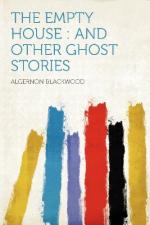Meanwhile he could enjoy a quiet and lonely evening with the room all to himself.
In the daytime he was a reporter on an evening newspaper of sensational and lying habits. His work was chiefly in the police courts; and in his spare hours at night, when not too tired or too empty, he wrote sketches and stories for the magazines that very rarely saw the light of day on their printed and paid-for sentences. On this particular occasion he was deep in a most involved tale of a psychological character, and had just worked his way into a sentence, or set of sentences, that completely baffled and muddled him.
He was fairly out of his depth, and his brain was too poorly supplied with blood to invent a way out again. The story would have been interesting had he written it simply, keeping to facts and feelings, and not diving into difficult analysis of motive and character which was quite beyond him. For it was largely autobiographical, and was meant to describe the adventures of a young Englishman who had come to grief in the usual manner on a Canadian farm, had then subsequently become bar-keeper, sub-editor on a Methodist magazine, a teacher of French and German to clerks at twenty-five cents per hour, a model for artists, a super on the stage, and, finally, a wanderer to the goldfields.
Blake scratched his head, and dipped the pen in the inkpot, stared out through the blindless windows, and sighed deeply. His thoughts kept wandering to food, beefsteak and steaming vegetables. The smell of cooking that came from a lower floor through the broken windows was a constant torment to him. He pulled himself together and again attacked the problem.
" . . . for with some people,” he wrote, “the imagination is so vivid as to be almost an extension of consciousness. . . .” But here he stuck absolutely. He was not quite sure what he meant by the words, and how to finish the sentence puzzled him into blank inaction. It was a difficult point to decide, for it seemed to come in appropriately at this point in his story, and he did not know whether to leave it as it stood, change it round a bit, or take it out altogether. It might just spoil its chances of being accepted: editors were such clever men. But, to rewrite the sentence was a grind, and he was so tired and sleepy. After all, what did it matter? People who were clever would force a meaning into it; people who were not clever would pretend—he knew of no other classes of readers. He would let it stay, and go on with the action of the story. He put his head in his hands and began to think hard.




